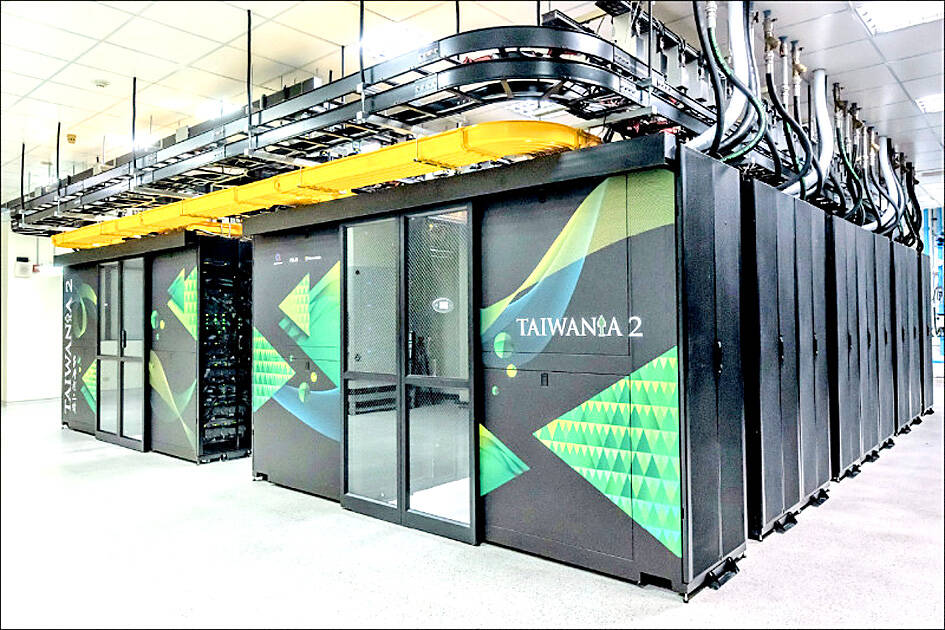Taiwan’s first next-generation supercomputer for artificial intelligence (AI), which would be equipped with Nvidia’s H100 graphics processing units (GPU), is scheduled to begin working with a capacity of 16 petaFLOPS in May. The government is planning to gradually expand the computing power to 200 petaFLOPS to facilitate the development of applications for generative AI and artificial general intelligence, also known as strong AI.
One petaFLOP is equivalent to 1 quadrillion calculations per second.
The National Center for High-performance Computing (NCHC) is tasked with building supercomputers to be used by researchers of physics, chemistry, mathematics, atmospheric science, engineering, life science and AI.

Photo courtesy of the National Center for High-Performance Computing
Researchers, the government and academic institutions can apply to access those computers.
The center’s supercomputer for AI, Taiwania 2 (台灣杉二號), has a computing power of nine petaFLOPS, which is capable of processing massive datasets, deep learning and AI computing. It was built in 2018 using Nvidia’s VI00 GPU.
With the rapid development of AI, the center wanted to build a next-generation AI supercomputer with more advanced GPUs to succeed Taiwania 2. The new supercomputer, which uses Nvidia’s H100 GPU as its main framework, is to be available for use in May and would have a computing power of 16 petaFLOPS, the NCHC’s plan showed.
It also plans to increase the computing power of the new supercomputer to 100 petaFLOPS, or even 200 petaFLOPS. The scale would be determined by the funding allocated to the project.
The center has yet to decide on the name for the new supercomputer.
Council officials said that the new supercomputer would facilitate the development of generative AI and strong AI, and could be integrated into a one-stop AI cloud service platform when a traditional Chinese version of Trustworthy AI Dialogue Engine is added.
Generative AI uses generative models to produce text, images, videos or other forms of data, while strong AI refers to machines that have intelligence and capabilities comparable to human cognition. The latter possesses the ability to learn, reason and adapt to unfamiliar environments.
The platform would provide computing power and a large language model base, which would help reduce the amount industry operators spend on developing a large language model base, they said.
It would also allow industry operators of various disciplines to create customized knowledge bases and other applications using their own datasets, they added.
The NCHC also uses the Taiwan 3 and the Forerunner 1 for high-performance computing, which were built using central processing units.
It plans to upgrade the computing power and energy use efficiency of supercomputers through the Taiwan Chip-based Industrial Innovation Program and Southern Silicon Valley project, with the goal of reaching 480 petaFLOPS in the government sector by 2029.
In the same year, the nation’s accumulative computing power would top 1.2 exaFLOPS when efforts from the private sector are included.

Taiwan has received more than US$70 million in royalties as of the end of last year from developing the F-16V jet as countries worldwide purchase or upgrade to this popular model, government and military officials said on Saturday. Taiwan funded the development of the F-16V jet and ended up the sole investor as other countries withdrew from the program. Now the F-16V is increasingly popular and countries must pay Taiwan a percentage in royalties when they purchase new F-16V aircraft or upgrade older F-16 models. The next five years are expected to be the peak for these royalties, with Taiwan potentially earning

STAY IN YOUR LANE: As the US and Israel attack Iran, the ministry has warned China not to overstep by including Taiwanese citizens in its evacuation orders The Ministry of Foreign Affairs (MOFA) yesterday rebuked a statement by China’s embassy in Israel that it would evacuate Taiwanese holders of Chinese travel documents from Israel amid the latter’s escalating conflict with Iran. Tensions have risen across the Middle East in the wake of US and Israeli airstrikes on Iran beginning Saturday. China subsequently issued an evacuation notice for its citizens. In a news release, the Chinese embassy in Israel said holders of “Taiwan compatriot permits (台胞證)” issued to Taiwanese nationals by Chinese authorities for travel to China — could register for evacuation to Egypt. In Taipei, the ministry yesterday said Taiwan

Taiwan is awaiting official notification from the US regarding the status of the Agreement on Reciprocal Trade (ART) after the US Supreme Court ruled US President Donald Trump's global tariffs unconstitutional. Speaking to reporters before a legislative hearing today, Premier Cho Jung-tai (卓榮泰) said that Taiwan's negotiation team remains focused on ensuring that the bilateral trade deal remains intact despite the legal challenge to Trump's tariff policy. "The US has pledged to notify its trade partners once the subsequent administrative and legal processes are finalized, and that certainly includes Taiwan," Cho said when asked about opposition parties’ doubts that the ART was

If China chose to invade Taiwan tomorrow, it would only have to sever three undersea fiber-optic cable clusters to cause a data blackout, Jason Hsu (許毓仁), a senior fellow at the Hudson Institute and former Chinese Nationalist Party (KMT) legislator, told a US security panel yesterday. In a Taiwan contingency, cable disruption would be one of the earliest preinvasion actions and the signal that escalation had begun, he said, adding that Taiwan’s current cable repair capabilities are insufficient. The US-China Economic and Security Review Commission (USCC) yesterday held a hearing on US-China Competition Under the Sea, with Hsu speaking on